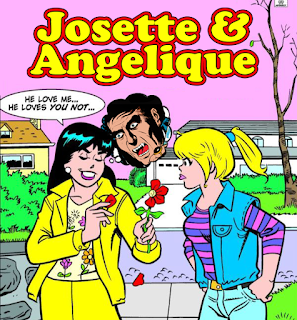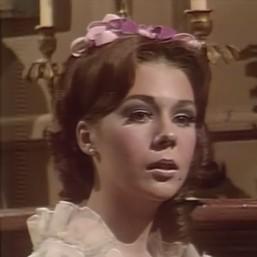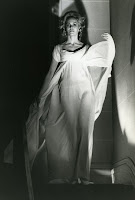In a post about the 1991 Dark Shadows “revival,” I compared
the series to an ill-conceived cover song. I had this long diatribe planned
that compared Don Henley’s “Boys of Summer” to the odious cover by The Ataris
as an example of how sentiment can be totally obliterated while still
preserving structure, narrative and intent. But I scrapped that part of the
piece for fear that someone would get the mistaken impression that I like Don
Henley.
But the 1991 series is the equivalent of a bad cover song,
and I’m beginning to wonder if the same can’t be said for the new Tim Burton
movie, which appears to carry over some of the revival show’s curious creative
decisions. Again, we’re introduced to Collinwood through governess Victoria
Winters who, as in the 1991 series, was kinda/sorta the reincarnation of Josette
DuPres. Willie Loomis has also been described as a “drunken handyman,” which
sounds more like 1991 Willie Loomis than any character played by John Karlen on
the original series.
I don’t want to be quick to judge a film I haven’t seen, but
these decisions created serious problems in the original series, and I can’t
help but believe they will serve the new film in a positive way.
Victoria Winters pushed Maggie Evans almost
entirely out of the picture in the ’91 series, a decision prompted by one
narrative goal: to bind the audience to a character who is equally new to the show’s
concept. It’s a cheap way to buy an audience’s empathy, but it works. But it
only worked for about 15 minutes, because the role served by Winters in the
original story was much more complex: she was at the center of a mystery surrounding
her identify.
You might even say that Dark Shadows, before Barnabas
Collins arrived, was really about Victoria Winters' identity and her suggested blood ties to the Collins clan,
with rest of the subplots merely orbiting this central mystery. When that element was
removed in 1991, it not only robbed Victoria Winters of any meaning, but made the character of Elizabeth Collins-Stoddard inconsequential.
I also think that having the wealthy, entitled Josette
reborn as a struggling waitress is a lot more interesting .
Willie Loomis, a character whose arc was about redemption in
the original series, was mostly gutted in the revival series, too. When
introduced, Willie was an aimless, violent dirtbag, but quickly turned into the
show’s most interesting character when he put himself between Barnabas and his
potential victims. As much as I love Jackie Earle Haley, I just haven’t been
impressed by what little we’ve been shown of the character.
Maybe I’m expecting too much from a two-hour movie. As a
comicbook fan, I’ve had to endure a lot of crummy Hollywood “interpretations”
of characters over the years, so I’m a decorated fanboy veteran of these
peculiar battles. But maybe it’s time we stopped looking at Hollywood to
validate our passions, because it’s next to impossible for a two-hour film to
present us with the same kind of experience we get from longform, serialized
fiction (see From Hell, Fantastic Four, The X-Files, pretty much any Charles
Dickens adaption, etc.)
I know movies are “bigger” and “more expensive” projects,
but usually they feel a little less than grand.





